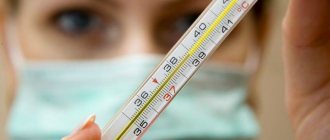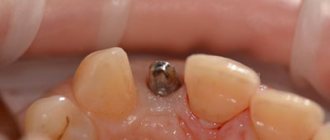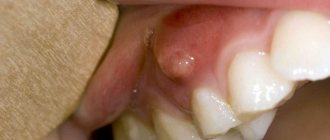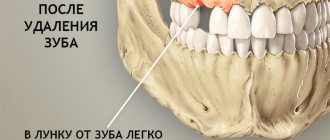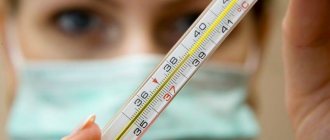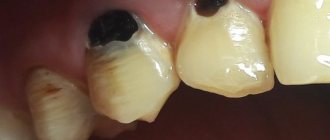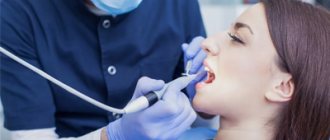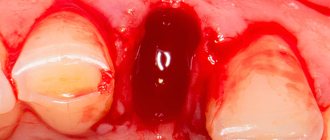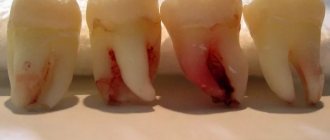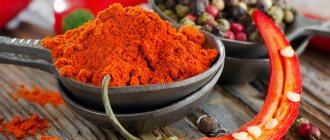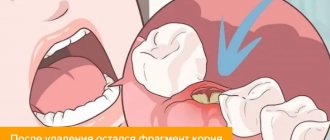28.10.2019
Tooth extraction is an operation, no matter how simple and common it may be, but it is a surgical intervention. Consequently, despite its relative simplicity, it is fraught with the risk of complications, which, fortunately, are much less common than successful outcomes.
After tooth extraction, antibiotics are very often prescribed. Is it correct? Let's find out in this article.
Possible complications
The most common complications after tooth extraction are associated with the development of an infectious process in the socket, which in turn is rare, but can still cause the development of generalized infectious inflammation, even death.
Such cases can be observed when phlegmon of the neck develops - a purulent inflammatory process of the neck, which can affect the vessels passing through this organ, for example, the carotid artery. As a result, a blood clot is formed, and this, in turn, is fraught with the fact that it can break off and get into any organ at any time. Most often this occurs in the lungs. The possibility of developing pulmonary embolism cannot be excluded.
Let us repeat that such cases, fortunately, are rare, but are still possible given a certain combination of factors in the patient’s health condition.
To avoid these consequences, it is necessary to monitor the doctor and follow all his prescriptions after tooth extraction.
Compliance with hygienic requirements for oral cavity treatment is mandatory. This is one of the fundamental factors in the course of the postoperative recovery period. If you follow these simple requirements, recovery processes proceed as planned and easily.
Many people are interested in what antibiotics will help after tooth extraction.
Side effects
Long-term use of antibiotics may cause side effects
Their manifestation can be triggered by incorrect selection and prescription of the drug, as well as if the rules for its use have been violated.
The pharmacodynamics of antibiotics is based on the absorption of the active substances of the drug by the intestines, followed by its distribution throughout all tissues of the body.
The active substances of the antibiotic undergo breakdown in liver cells and, together with bile, feces and urine, are excreted from the body.
With long-term use of the drug, the following side effects may occur:
- Development of dysbacteriosis or candidiasis.
- Attacks of nausea.
- Vomiting.
- Inflammatory processes in the oral cavity.
- Allergic dermatitis on the skin of the body and face.
- Minor vascular bleeding in the oral cavity.
- Kidney and liver dysfunction.
- Weakening of the body's protective functions.
Important! If side effects occur, you should immediately stop taking the drug and replace it as prescribed by your doctor.
Pain
An absolutely normal symptom after removal surgery is pain, often severe, which intensifies a couple of hours after the operation, when
The anesthesia wears off. The pain may last for several days, but gradually weakens every day.
For pain relief, dentists prescribe non-steroidal anti-inflammatory drugs, for example, Ketanov or Meloxicam. These are modern means. If for some reason they are not available to the patient, simpler painkillers can be used. But it quite happens that they do without analgesics. For example, people with a high pain threshold do not need pain relief. You should also not overuse painkillers, because this can mask possible complications of the postoperative period. If you see that you have to increase the dose of your painkiller after three days, this is a mandatory reason to see a doctor.
There are also cases when, in the postoperative period, in order to improve blood clotting, hemostatic drugs (drugs that help stop bleeding) are prescribed: “Ascorutin”, “Transcam”, “Ditsinon”, “Vikasol”, etc. These prescriptions are made when the patient has low blood clotting or bleeding.
But in general, antibiotics are always prescribed after tooth extraction.
The course of the postoperative recovery period
Let's consider the main characteristics of the postoperative period:
- The appearance of swelling at the site of an extracted tooth is normal. This is especially common after the removal of a number eight (wisdom tooth).
- There may be a bluish swelling at the removal site, which is also normal. This is usually characteristic of patients suffering from high blood pressure.
- On the first day after surgery, you may also experience high body temperature and deterioration in health.
There is no need to be afraid of all of the above. Normally, these unpleasant symptoms decrease every day.
Is it really necessary to take antibiotics after tooth extraction?
When it's justified
The practice of prescribing antibiotics precisely after the removal of the figure eight is very common. However, not all patients need this. We list the most common cases of their purpose:
- the tooth was removed promptly, as a result of acute and severe inflammation, i.e. unscheduled;
- During removal, the gum or tooth socket was damaged;
- removal or postoperative period is accompanied by severe bleeding;
- with severe inflammation on the adjacent gums;
- a difficult operation to perform;
- reduced immunity or various chronic diseases in the patient, which slow down the recovery process;
- elderly patients.
Patients often ask whether to take antibiotics after tooth extraction.
These drugs are not always prescribed immediately. They may be prescribed later if the following symptoms are detected:
- strong pain;
- severe redness, swelling of tissue at the site of removal;
- suppuration or necrotization of tissue in the hole;
- no protective blood clot is detected in the socket;
- hyperthermia.
Antibiotics are quite often prescribed after the removal of a wisdom tooth, especially if it was impacted (partially erupted and hidden in the gum) or dystopic (had an incorrect position in the jaw). Such removal operations very often carry a potential risk of developing infectious complications. In addition, antibiotics are prescribed if the extracted tooth contained a purulent cyst.
In addition to antimicrobial agents, non-steroidal anti-inflammatory drugs are often prescribed in the postoperative period to relieve inflammation, as well as rinsing with antiseptic solutions.
Whether antibiotics are needed after tooth extraction should be checked with your doctor.
Many patients unfairly ignore rinsing recommendations. But in vain. It aims to create a wound-healing effect, as well as provide an anti-inflammatory effect. This also needs to be done correctly. Do not rinse too vigorously, as this will only cause the wound to bleed. In addition, such increased movements of the solution in the mouth can cause the penetration of opportunistic oral flora into the tooth socket, thereby causing an inflammatory process. You can simply put the solution in your mouth and hold it for 10-15 minutes. This rinsing procedure can then be repeated.
So antibiotics after tooth extraction are not needed in every case.
Treatment rules
The oral cavity is home to “healthy” rich microflora. Taking antibacterial drugs causes the death of the necessary lacto- and bifidobacteria and leads to a rapid increase in the number of pathogenic strepto-, pneumo-, and staphylococci.
Important! Taking antibiotics for dental diseases harms the microflora of the oral cavity in any case, regardless of which dosage form of the drug was chosen by the attending physician (oral medications, injections, capsules, drops, applications).
Treatment with antibiotics excludes the use of alcoholic beverages, psychotropic, sleeping pills and narcotic drugs. If we are talking about tablets, capsules or local antibiotics, then they are used an hour before or 2 hours after a meal, otherwise the absorption of the drug will be complicated. Take the tablets with warm boiled water.
How many days to take antibiotics: if there is no therapeutic effect after 2-3 days from the start of treatment, the drug must be replaced (or the dosage adjusted). Pregnant and lactating women, children, and patients with chronic diseases can take antibiotics only after consulting a doctor.
Antibiotics do not cope with pain and swelling, so patients who have undergone extraction are additionally prescribed antihistamines, anti-inflammatory and painkillers
Solutions used for mouth rinsing
The pharmaceutical market offers a sufficient range of ready-made rinsing solutions. These are solutions based on chlorhexidine, as well as the well-known “Furacilin”. You can also prepare a soda or saline solution at home (1 teaspoon per glass of water). The concentration cannot be increased, because this can cause a chemical burn to the oral cavity. Herbal decoctions are also perfect - chamomile, sage, oak bark and others. They also provide an excellent restorative and anti-inflammatory effect. So, let's consider which antibiotics to purchase after tooth extraction.
Protected penicillins
They are the most widely represented and widely used group of antibiotics prescribed by dentists. Here are examples of drugs included here:
- "Flemoxin".
- "Flemoclav".
- "Amoxicillin."
- "Amoxiclav".
What antibiotics should I take after wisdom tooth removal?
There are many analogues and trade names of these antibiotics.
These are all antibiotics with a wide spectrum of activity. They are effective against both gram-positive and gram-negative bacteria.
If there is a threat of generalization of infection in the body, antibiotics are prescribed intramuscularly or intravenously. In more common cases, oral antibiotics are indicated.
The course of treatment is determined by the doctor taking into account the patient’s age, weight and the presence of complications after surgery or based on test results, if any. The tolerability of the drug is also taken into account. Accepted within five to seven days.
What other antibiotics are prescribed after wisdom tooth removal?
Aminoglycosides
These are drugs based on gentamicin and amikacin. They are used for intravenous and intramuscular injections. This group of drugs is prescribed when the postoperative wound is already infected in order to prevent infection from entering the circulatory system. They have a wide spectrum of action.
It is important to note that this group of drugs has strict contraindications during pregnancy and lactation, as well as for children.
Fluoroquinolones
Fluoroquinolones based on the active substance digitran are used in dentistry. They are prescribed if an infected complication or a threat of infection of a postoperative wound is detected. They are available both in tablet form and in the form of injection solutions. The course of treatment is usually 7 days. In case of a complicated course, the course of treatment is extended to 14 days.
You can take other antibiotics after tooth extraction.
Lincosamides
In dentistry, Lincomycin is often used, which also has a wide range of antibacterial activity. The course of treatment with the drug usually ranges from 7 to 14 days. "Lincomycin" is not prescribed to pregnant women, persons with severe liver disease, or women during breastfeeding.
Like all drugs, antibiotics have a number of side effects. It is worth noting the following:
- allergic reactions;
- individual intolerance to the active substance of the drug;
- adverse reactions from the stomach and intestines: nausea, vomiting, diarrhea;
- headache;
- dizziness;
- cardiopalmus;
- disorders of the liver and kidneys;
To avoid side effects, a test dose of the drug is prescribed. It is also recommended to take an antibiotic along with antihistamines at least on the first day. This is done in order to reduce the severity of a possible reaction.
Not everyone knows what antibiotics to take after tooth extraction.
Contraindications
Antibacterial drugs are prescribed exclusively by a doctor, as drugs in this group have a wide range of contraindications. This takes into account the physiological characteristics of the body, the presence of chronic diseases and the age category of the patient.
Antibacterial drugs should not be used in the following cases:
- Each antibacterial drug has its own list of main contraindications and features of its use.
Dysfunction of the digestive system.
- Breastfeeding period.
- During gestation of an intrauterine fetus.
- Individual intolerance to the drug.
- The presence of allergic reactions to the components of the antibiotic.
- Kidney failure.
- Liver diseases of any etiology.
- Age category up to 12 years.
- Diabetes mellitus of any type.
- Arterial hyperplasia.
Each antibacterial drug has its own list of main contraindications and features of its use. Therefore, before using it, it is recommended to study the annotation for it.
Advice for patients
In addition to all of the above, there are general recommendations from dentists during the postoperative period:
- You should refrain from eating for at least 2-3 hours after surgery. This is the time during which the blood in the wound finally coagulates and the result of the hemostasis system is consolidated.
- It is advisable to eat soft food for 3 days to avoid injury to the socket of the extracted tooth. It is also advisable to avoid eating too cold or hot food.
- Alcohol consumption is contraindicated, as it leads to a decrease in local immunity and causes vasodilation, which in turn contributes to the development of postoperative complications.
- Any procedures that lead to vasodilation are contraindicated, as they may cause bleeding. You should avoid baths, saunas, and prolonged exposure to the sun.
- It is forbidden to pick at a postoperative wound. This is a direct and sure path to infection with consequences in the form of a severe inflammatory process.
We looked at what antibiotics to take after tooth extraction.
Category: Tooth extraction Published by Mister stomatolog
Main activities after extraction
As soon as the tooth is removed, the doctor treats the empty socket and places a cotton swab soaked in the medicinal composition into it. In some cases, stitches may be required. On the recommendation of the dentist, the tampon is removed several hours after the manipulations.
During this time period, it is forbidden to eat, smoke, drink, talk, that is, it is better not to open your mouth at all. You should also not touch the hole with your fingers or insert foreign objects into it. To disinfect (disinfect) the oral cavity, you should use Furacilin, Miramistin, Chlorhexidine, Chlorophyllipt.
Important! To prevent postoperative bleeding, you should not bend over, lift heavy objects, visit saunas, or take hot baths.
Upon completion of the extraction, patients can be prescribed antibacterial compounds in various dosage forms - tablets, capsules, drops, local solutions and applications
